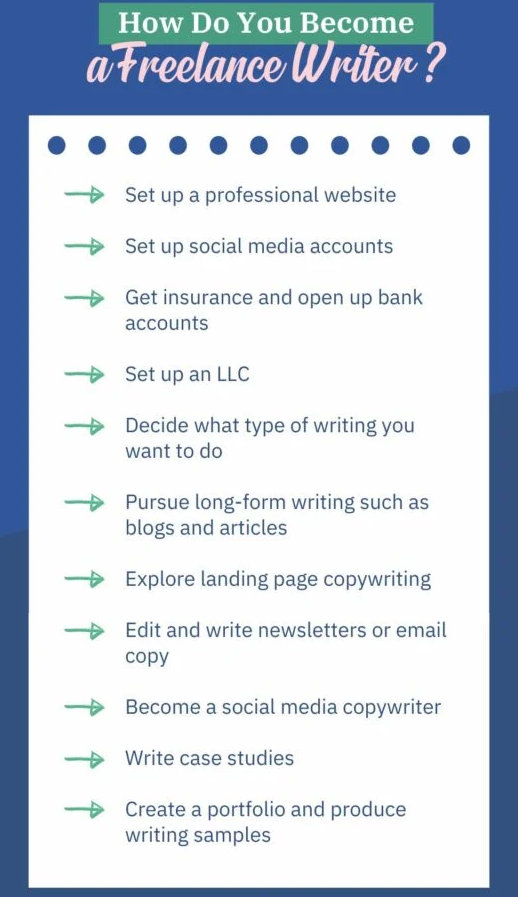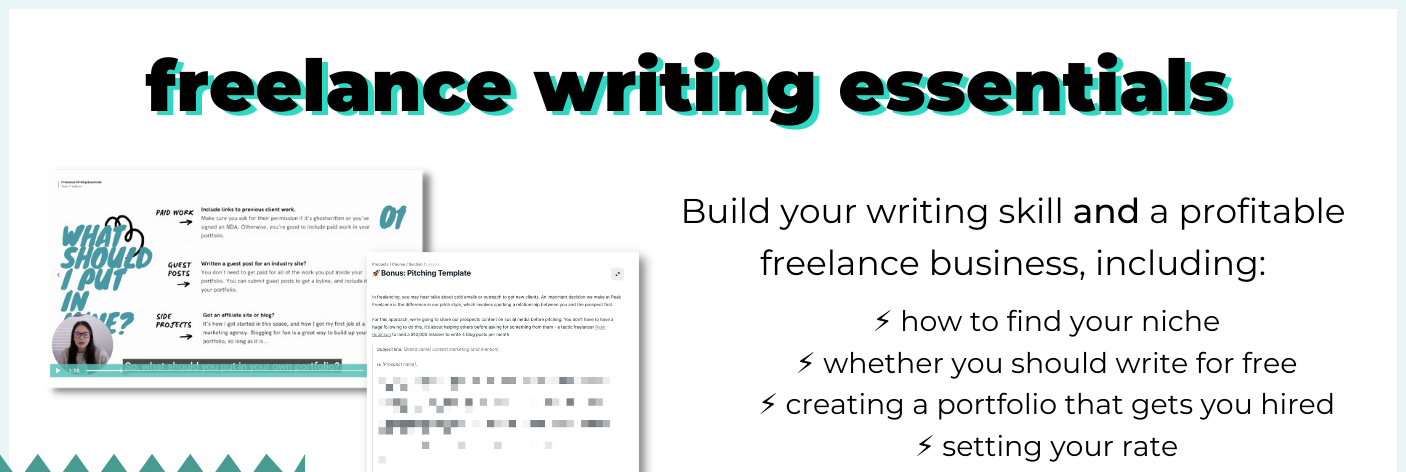How To Become A Freelance Writer? Tips And Tricks For Success
Embark on a rewarding journey on how to become a freelance writer. Explore tips, niche selection, portfolio building, and platforms to kickstart your writing career successfully.
Author:Emmanuella SheaReviewer:Frazer PughJan 10, 20241.5K Shares66.7K Views

Becoming a freelance writer can be a rewarding and fulfilling career choice, allowing you to showcase your creativity and writing skills while enjoying the flexibility of working on your own terms. So, how to become a freelance writer?
What Is The Job Of A Freelance Writer?
A freelance writer can provide a variety of content for a broad clientele in a variety of industries. While some freelance writers write in a range of genres, such as fiction and nonfiction, others may focus on one specific expertise.
Freelance writers typically contact clients by phone, email, or video conference because they are not required to work on-site. The majority of writers operate remotely as independent contractors, however, some might collaborate with full-time employees as well as other freelancers.
What Is Required To Work As A Freelance Writer?
Three things are necessary for successful freelance writing: a portfolio of writing samples, great ideas, and a network. These are in addition to patience, persistence, and a sense of budgeting. Meeting the proper individuals can be difficult, but knowing them opens doors to new projects and responsibilities as well as the ability to help others in the future.
To get your freelance writing job off the ground, you might need to rely on cold-pitching at first. Make plans to grab coffee with some of your favorite local writers, or sign up for an online club for freelance writers where you can freely share resources and editor contacts.
A competent writer is also capable of writing in genres other than their own, and this is a critical skill set that you should emphasize in your portfolio. If you have a specialty, pursue it further, but don't rule out assignments that present a greater difficulty.
Freelance Writer Salary
The US Bureau of Labor Statisticsreported that, in 2019, the median annual salary for writers and authors in the United States was $63,200, with an average hourly wage of $30.40. But both freelancers and salaried writers, who are usually more experienced and paid better, are included in that statistic. A more realistic estimate of freelance writers' hourly pay is about $23.90, according to PayScale.com.
It can be quite difficult to start off as a freelance writer without experience and make a respectable living. But things will definitely perk up if you secure your first round of freelance writing assignments and assemble a portfolio. You will be able to better focus your writing to a specific audience and command greater prices if you can articulate to clients the value of what you do.
The pace at which you write and your agreed-upon rate will be the two main determinants of your earnings if, like most freelancers, you bill by the word.
Even while certain content just requires more time to create than others, you will undoubtedly get more proficient at writing over time. It could take you an hour to create and edit 200 words for a simple blog if you're a novice writer. However, you might be writing 500 or 600 words per hour within a few months.
On the other hand, rate per word varies depending on the kind of writing you do and fluctuates from customer to client. Reviews and blogs, for instance, are typically easier to write and have a lower word value per word than intricate opinion pieces for large news websites.
Additionally, the typical salary for freelance writing varies significantly over time. Visit the Who Pays Writers page to find out what authors are now getting paid. Freelancers can submit anonymous reports of their earnings from various clients using this free resource. It's evident that certain companies pay more than $1 per word for highly specialized material, while others just pay $0.04 for basic blog posts.
Whether you're a seasoned writer or just starting, here's a comprehensive guide on how to become a freelance writer:
Develop Your Writing Skills
Embarking on a freelance writing career begins with a steadfast commitment to developing your writing skills. This foundational step is integral, serving as the cornerstone upon which your entire journey rests.
Reading widely is the initial stride, exposing yourself to a diverse array of writing styles and genres. Immerse yourself in books, articles, and blogs spanning various topics, allowing your mind to absorb the nuances of language, tone, and structure.
Yet, the art of writing isn't confined solely to consumption. Regular writing practice is the crucible in which raw talent transforms into refined skill. Allocate dedicated time each day to put pen to paper, or rather, fingers to keys, experimenting with different tones, styles, and formats.
This consistent effort fosters not only fluency but also the evolution of a distinct voice, a signature that distinguishes your work in the competitive realm of freelance writing.
Identify Your Niche
As your writing skills mature, the next pivotal stride in your freelance writing odyssey is to identify your niche. This isn't merely a choice; it's a strategic decision that shapes your trajectory in the freelance market. Selecting a niche involves a delicate dance between passion and practicality. Consider the topics that not only ignite your enthusiasm but also align with your expertise or potential to acquire it.
This decision isn't arbitrary; it's a strategic alignment with market demands. Specializing in a niche renders you more marketable, a sought-after expert in a specific domain. Whether it's technology, health, finance, or creative writing, your niche becomes your professional playground, the arena where clients seek your prowess and perspective. This deliberate choice positions you as a specialist, carving out your unique space in the expansive landscape of freelance writing.
Build A Portfolio
With honed writing skills and a defined niche, the next architectural structure in your freelance writing journey is the portfolio. Think of it as your literary exhibit, a curated collection showcasing the prowess you've meticulously cultivated. Building a portfolio involves more than amassing a pile of documents; it demands a thoughtful selection of pieces that exemplify your range, style, and mastery within your chosen niche.
Consider your portfolio as your virtual storefront, the showcase that potential clients peruse to gauge your suitability for their projects. A personal website becomes the canvas on which your portfolio unfolds, a space where your identity as a freelance writer is etched. Populate it with samples that encapsulate the essence of your expertise, allowing clients to envision the caliber of work they can expect from your quill.
Create A LinkedIn Profile
In the digital age, establishing an online presence is imperative for any freelance writer, and creating a compelling LinkedIn profile is a strategic move. Your LinkedIn profile is more than a digital resume; it's a dynamic representation of your professional journey. Begin by optimizing the essential elements: a professional profile picture, a concise headline, and a well-crafted summary that encapsulates your journey as a freelance writer.
Detail your skills and experiences, emphasizing your writing expertise, niche specialization, and any relevant accomplishments. Use this platform not just as a static representation but as a dynamic networking tool. Connect with professionals in your niche, engage in discussions, and share your insights. LinkedIn is not merely a digital resume but a gateway to a network of potential clients, collaborators, and opportunities.
Understand The Business Side
Becoming a freelance writer isn't solely about the art of writing; it's a venture into entrepreneurship. Understanding the business side is crucial for sustainable success. Begin by setting your rates judiciously. Research prevailing rates in your niche, considering factors such as your experience, the complexity of the work, and industry standards. This strategic pricing not only reflects your worth but also positions you competitively in the freelance market.
Create clear and comprehensive contracts for your projects. Clearly define the scope of work, payment terms, deadlines, and any specific requirements. A well-crafted contract not only establishes professionalism but also safeguards your interests and sets expectations for both you and your clients. As you delve into freelance writing, keep meticulous records of your income and expenses. Utilize accounting tools or software to maintain organized financial records, facilitating smooth tax filings and financial management.
Join Freelance Platforms
The digital landscape has revolutionized how freelancers find opportunities, and joining freelance platforms is a dynamic avenue for expanding your reach. Platforms like Upwork, Fiverr, and Freelancer are bustling marketplaces where clients seek skilled writers. Create profiles on these platforms, ensuring they mirror the professionalism and expertise showcased on your personal website and LinkedIn profile.
When applying for projects on freelance platforms, tailor your proposals to each client's needs. Highlight how your skills align with their requirements and demonstrate a clear understanding of the project. Freelance platforms are not just transactional spaces; they are communities.
Engage with other freelancers, participate in discussions, and stay abreast of industry trends. These platforms not only connect you with potential clients but also serve as valuable hubs for learning, networking, and enhancing your freelance writing journey.
Network And Market Yourself
In the realm of freelance writing, networking and self-marketing are not just optional add-ons; they are essential strategies for building a sustainable career. Networking begins with utilizing social media platforms strategically. Establish a presence on Twitter, LinkedIn, Instagram, or other relevant platforms.
Share your writing journey, engage with your audience, and actively participate in discussions within your niche. Networking isn't just about self-promotion; it's about building genuine connections with fellow writers, potential clients, and industry professionals.
Attend virtual or local writing events, join forums, and immerse yourself in the community. Networking is a reciprocal endeavor, offer support, insights, and collaboration to others, and you'll find the freelance writing community reciprocating in kind. The connections you forge can lead to collaborations, referrals, and valuable insights that contribute to your growth as a freelance writer.
The art of self-marketing goes hand in hand with networking. Develop an elevator pitch that succinctly communicates your expertise and unique value proposition.
Utilize your personal website, blog, and social media platforms to showcase not only your writing samples but also your personality and passion for your niche. Craft engaging content that reflects your voice and expertise, attracting potential clients and opportunities.
Deliver High-Quality Work
Delivering high-quality work is the bedrock of a successful freelance writing career. Beyond meeting deadlines, freelance writers must consistently produce content that exceeds expectations. This requires not only a commitment to excellence in writing but also a deep understanding of the client's needs and goals.
Effective communication is paramount. Clearly grasp the client's requirements, ask clarifying questions, and ensure you have a comprehensive understanding of the project. When submitting work, ensure it is polished, error-free, and aligned with the client's expectations. High-quality work not only satisfies the immediate project requirements but establishes a foundation for long-term relationships with clients.
Meeting deadlines is a non-negotiable aspect of delivering quality work. Respect the agreed-upon timelines and, if unforeseen circumstances arise, communicate proactively with the client. Reliability and professionalism in meeting deadlines contribute significantly to building trust with clients, which is invaluable in the freelance writing landscape.
Seek feedback from clients after completing projects. Constructive criticism is a powerful tool for improvement. Understanding what worked well and areas for enhancement positions you to continuously refine and elevate the quality of your work.
Adapt And Evolve
The freelance writing landscape is dynamic, shaped by evolving trends, technologies, and client expectations. To thrive in this environment, freelance writers must embrace adaptability and a commitment to continuous improvement.
Stay informed about industry trends, emerging writing techniques, and shifts in market demands. Subscribe to relevant publications, follow thought leaders in your niche, and participate in webinars or workshops. This proactive approach ensures you remain current, positioning yourself as a writer who can navigate the ever-changing landscape.
Diversify your skills to stay competitive. Explore additional writing styles, learn complementary skills such as SEO, content marketing, or social media management. This versatility not only expands your service offerings but also enhances your appeal to a broader range of clients.
Network with fellow writers, attend industry events, and engage in conversations that expose you to different perspectives and ideas. This exposure fosters creativity, broadens your horizons, and contributes to your growth as a writer.
How To Become A Freelance Writer? - FAQs
How To Start A Career As A Freelance Writer?
Begin by developing your writing skills, choosing a niche, building a portfolio, and creating an online presence through a professional website and social media.
What Are Some Popular Freelance Writing Niches?
Popular freelance writing niches include content marketing, copywriting, technical writing, blogging, SEO writing, and creative writing, among others.
How To Create A Writing Portfolio For Freelance Work?
Create a portfolio by showcasing samples of your work, including articles, blog posts, or any relevant content. A personal website is an excellent platform for displaying your portfolio.
What Are The Best Freelance Platforms For Writers?
Upwork, Fiverr, Freelancer, and Guru are popular freelance platforms where writers can find clients and projects.
How To Determine Freelance Writing Rates?
Research rates in your niche, consider your experience, and factor in the complexity of the work. Setting competitive yet reasonable prices is crucial.
How To Become A Freelance Writer With No Experience?
- Write exemplars.
- Seek assistance from a writing agency.
- Start a weblog.
- Compose letters to loved ones.
- Connect with other independent contractors.
- Use a content network as a starting point.
- Edit and review your grammar.
- Study up on search engine optimization.
How Much Do Freelance Writers Make A Month?
The average monthly salary for a freelance writer in the US as of December 31, 2023, is $4,034 a month.
Conclusion
How to become a freelance writer? Becoming a successful freelance writer requires a combination of writing talent, business acumen, and a proactive approach to self-promotion. By honing your skills, identifying your niche, and effectively marketing yourself, you can embark on a fulfilling freelance writing career. Remember, perseverance and continuous improvement are key to long-term success in the freelance writing industry.
Jump to
What Is The Job Of A Freelance Writer?
What Is Required To Work As A Freelance Writer?
Freelance Writer Salary
Develop Your Writing Skills
Identify Your Niche
Build A Portfolio
Create A LinkedIn Profile
Understand The Business Side
Join Freelance Platforms
Network And Market Yourself
Deliver High-Quality Work
Adapt And Evolve
How To Become A Freelance Writer? - FAQs
Conclusion

Emmanuella Shea
Author

Frazer Pugh
Reviewer
Latest Articles
Popular Articles

